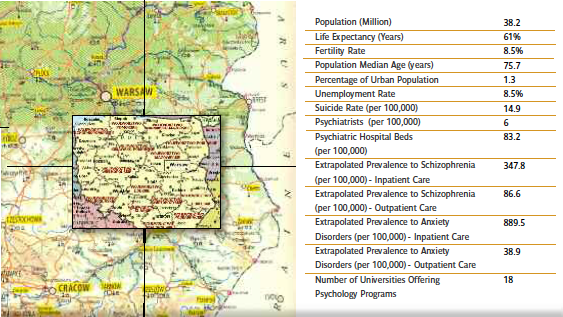
By Emily Butcher
Since the German occupation of Poland beginning in 1939, Poland has been rebuilding its healthcare system. This occupation proved to be a major setback as the Nazis first targeted psychiatric inpatients in hospitals – a huge number perished during this time – and the existing medical system was dismantled. As the country attempted to rebuild its healthcare system in 1945, psychiatry was not a high priority. In the 1950s it was discovered that there was a large def icit in the number of psychiatric beds in central Poland, resulting in the transfer of patients in need to western Poland where medical treatment could more easily be ensured. This quick-fix solution proved to impose stress on family ties and weaken relationships. Also, a lack in the number of available staff meant that adequate care was not always received and it was difficult to archive related data that would be of interest for long-term studies, including the prevalence of mental disorders. This further compounded the problem of adequately treating chronic mental disorders.
Rebuilding Foundations
In 1952, a special act was introduced by Parliament resulting in the creation of a comprehensive, free general healthcare system including in- and out-patient psychiatric services. To generate a higher number of new specialists in the f ield of medicine, students were given the option to receive f ree t raining to become physicians. Seven universities quickly established medical faculties and this, in turn, helped to develop available psychiatric services.
The introduction of the Mental Health Programme and the Mental Health Act in the mid-1990s acted as momentous catalysts to improve the future of psychiatric practices in Poland. Clinical psychology and psychiatry have been recognized as major specialties in the field of Medicine since 1999, with medical students encouraged to enter available programs. Currently, 18 universities offer psychology programs.

Possible Limitations
The structure fund budget allocates funds in Poland that go towards modernizing and setting up research facilities. Funds are accessible on a national and regional level and contribute towards creating University facilities, Centers of Excellence and Technology Parks based on multi scale domains. Research facilities, therefore, will be positively affected for the upcoming 2-3 years, but researchers voice concern over what it will mean for the development of such facilities and for their staff after the current funds are depleted. An insufficient level of national funds for already existing facilities means new growth will be slowed, perhaps offering a chance for self-finance systems or other methods to be explored.
Current Projects
Many oppor tunities are available for Poland to participate in international collaboration with countries around the world, and in bilateral programs with the U.S. Polish scientific centers have partnered with leading foreign centers to implement join research projects and exchange personnel. For example, The Department of Psychiatry and Combat Stress of the Military Medical Institute in Warsaw (DP&CS MMI) currently collaborates with the Virtual Reality Medical Center in San Diego, as well and the Virtual Reality Medical Institute (VRMI) in Brussels, Belgium to fur ther treatment for stress-related disorders. The organizations have shared software and related hardware, and VRMI representatives have assisted in personnel training to use the systems in Poland. Similarly, the Biological Threats Identification and Countermeasure Centre of the Military Institute of Hygiene and Epidemiology and the Institute of Electro-Optics of the Military Academy of Technology, centers in the Polish Armed Forces, work closely with international labs.
In particular, Universities and large research organizations benefit from these relationships, whether in the form of financing possibilities or furthering business ties. In particular, the 7th Frame- Work Programme set up by the European Commission allows Polish partners to fully participate in the European Research Area (ERA) and explore cutting edge technologies and research possibilities with other labs and countries. This program and other types of collaboration allow Polish participants to implement new technologies in their everyday work and further collaboration for learning and development opportunities.
Applied ICT Research in Poland
Advanced technologies are gradually being adopted into current practices. The DP&CS MMI is the first organization to use Virtual Reality (VR) technology in the prevention and treatment of mental disorders. “We have been successfully using this technology in a comprehensive therapy of fear disorders connected with combat stress experienced in military operations in Iraq (Operation Iraqi Freedom – OIF) and Afghanistan (International Security Assistance Force – ISAF),” said Prof. Dr. Stanislaw Ilnicki, a leading researcher in the program. Information and Communications Technology (ICT) research will assuredly play a large role in the development of Poland’s treatment of mental health problems in upcoming years. A rapidly growing market will include mobile solutions, including telemedicine, to provide easier access to multimedia medical records for medical staf f as well as patients. Adam Koprowski, a General Specialist for Telemedicine Development at the Warsaw Military Institute agrees that eHealth is a booming industry including diverse applications such as the implementation of complex Hospital Information Systems, as well as telemonitoring, sensoring and intelligent homes and buildings.
Additionally, the elderly population in Poland, similar to the t rend throughout other developed countries, will continue to grow, which will lead to a growth in healthcare facilities and implement ing ICT technology as needed. These populations in particular may benefit from tele-rehabilitation to manage chronic diseases through the delivery of specialized services through the Internet, such as an easily accessible software platform to aid in interaction between hospital personnel and at-home patients during the rehabilitation and monitoring processes, Koprowski says.
Spojrzenie Do Przyszłości
As has already been established, the use of ICT in the area of mental health protection in the Polish Armed Forces wi l l be applied in the psycho – and social support network as well as long-term monitoring of veterans’ quality of life. The application of VR therapy will undoubtedly see fur ther suppor t and growth and Ilnicki says, “We are going to continue to develop appl icat ions of VR in therapy of war-trauma related fear disorders and in stress-resistance training.” Lastly, in 2010 the Military Institute of Medicine in Warsaw (WIM) initiated a permanent tele-medicine communication project with the ISAF’s healthcare service which will be used for both psychiatric and psychological consultations.
Poland has suffered largely since the middle of the 20th century, but has determinedly built a strong foundation for a competent and competitive healthcare system. Through international collaboration and the visions of talented Polish researchers and caregivers, healthcare will continue to improve and gain strength, aided largely by advanced technologies.
Sources: Personal communication with Adam Koprowski and Stanislaw Ilnicki, M.D., The British Journal of Psychiatry, and World Health Organization
Emily Butcher Managing Editor C&R Magazine www.vrphobia.eu ebutcher@vrphobia.com
About Brenda Wiederhold
President of Virtual Reality Medical Institute (VRMI) in Brussels, Belgium.
Executive VP Virtual Reality Medical Center (VRMC), based in San Diego and Los Angeles, California.
CEO of Interactive Media Institute a 501c3 non-profit
Clinical Instructor in Department of Psychiatry at UCSD
Founder of CyberPsychology, CyberTherapy, & Social Networking Conference
Visiting Professor at Catholic University Milan.








